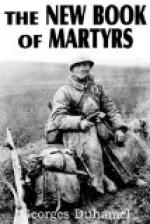“Poor Andre! Poor Andre!”
This cry of the rough man is unexpected, and grandiose as the voice of ancient tragedians chanting the threnody of a hero.
Then he drops his helmet, throws himself on his knees beside the death-bed, takes the dead face between his hands and kisses it gently and slowly with a little sound of the lips, as one kisses a baby’s hand.
I take him by the arm and lead him away. His sturdy body is shaken by sobs which are like the neighing of a horse; he is blinded by his tears, and knocks against all the furniture. He can do nothing but lament in a broken voice:
“Poor Andre! Poor Andre!”
XXVI
La Gloriette is amongst the pine-trees. I lift up a corner of the canvas and he is there. In spite of the livid patches on the skin, in spite of the rigidity of the features, and the absence for all time of the glance, it is undoubtedly the familiar face.
What a long time he suffered to win the right to be at last this thing which suffers no more!
I draw back the winding-sheet. The body is as yet but little touched by corruption. The dressings are in place, as before. And as before, I think, as I draw back the sheet, of the look he will turn on me at the moment of suffering.
But there is no longer any look, no longer any suffering, no longer even any movements. Only, only unimaginable eternity.
For whom is the damp autumn breeze which flutters the canvas hung before the door? For whom the billowy murmur of the pine-trees and the rays of light crossed by a flight of insects? For whom this growling of cannon mingling now with the landscape like one of the sounds of nature? For me only, for me, alone here with the dead.
The corpse is still so near to the living man that I cannot make up my mind that I am alone, that I cannot make up my mind to think as when I am alone.
For indeed we spent too many days hoping together, enduring together, and if you will allow me to say so, my comrade, suffering together. We spent too many days wishing for the end of the fever, examining the wound, searching after the deeply rooted cause of the disaster—both tremulous, you from the effort to bear your pain, I sometimes from having inflicted it.
We spent so many days, do you remember, oh, body without a soul ... so many days fondly expecting the medal you had deserved. But it seems that one must have given an eye or a limb to be put on the list, and you, all of a sudden, you gave your life. The medal had not come, for it does not travel so quickly as death.
So many days! And now we are together again, for the last time.
Well! I came for a certain purpose. I came to learn certain things at last that your body can tell me now.
I open the case. As before, I cut the dressings with the shining scissors. And I was just about to say to you, as before: “If I hurt you, call out.”




